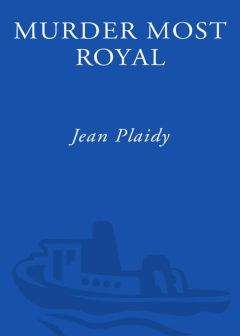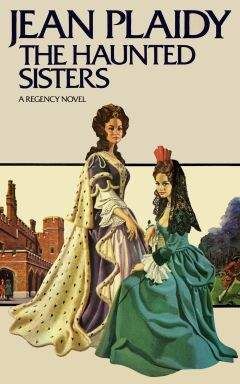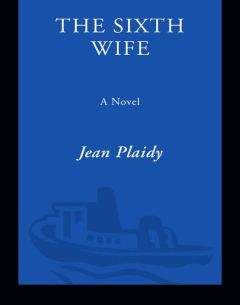Jean Plaidy - For a Queens Love: The Stories of the Royal Wives of Philip II
На сайте mybooks.club вы можете бесплатно читать книги онлайн без регистрации, включая Jean Plaidy - For a Queens Love: The Stories of the Royal Wives of Philip II. Жанр: Прочее издательство неизвестно,. Доступна полная версия книги с кратким содержанием для предварительного ознакомления, аннотацией (предисловием), рецензиями от других читателей и их экспертным мнением.
Кроме того, на сайте mybooks.club вы найдете множество новинок, которые стоит прочитать.

Jean Plaidy - For a Queens Love: The Stories of the Royal Wives of Philip II краткое содержание
For a Queens Love: The Stories of the Royal Wives of Philip II читать онлайн бесплатно
“So to England, my son, richly clad and in great splendor, carrying magnificent gifts, smiling on the people, quaffing their beer—it is loathsome, Renard tells me, but you will become accustomed to that— dancing attendance on the ladies, being a bluff and hearty fellow rather like their old King Henry—one of the biggest rogues in Christendom, but well liked among his people, who forgave him his sins because of his hearty manners.”
Philip let the dispatch drop from his hands. He went to the window and looked out on the shouting, laughing crowds in the streets.
He must go to England, marry an aging woman whom he disliked on hearsay, and get her with child; and he must be a jolly, hearty, bluff, splendor-loving man; he had to learn to become a person quite different from himself.
Ruy Gomez da Silva came into Philip’s apartments. Philip had showered honors on this well-beloved friend. Ruy was now Prince of Eboli; moreover, Philip had arranged his marriage with Ana de Mendoza y la Cerda, one of the richest heiresses in Spain. The marriage had taken place, but had not yet been consummated on account of the youth of the bride.
Philip was glad that Ruy was to accompany him into the barbaric island, but he did not say so, being as chary of showing his feelings as ever.
“What news?” he asked.
“Not good news, Highness. The English are gathering in the streets of their cities, shouting insults against Spain. They smile on the Princess Elizabeth; and they wish the Queen to marry Courtenay.”
“That we know,” said Philip. “But the Queen is strong. She put down the Wyatt rebellion, and she is eager for our match.”
“She is madly in love with your Highness.”
“It is not her feelings for someone she has never seen which are important,” said the Prince primly, for the thought of Mary’s doting adoration disturbed him deeply. “It is the temper of the people with which we are concerned.”
“Highness, doubtless they will try to keep this from you, but I think you should know it, for to be warned is to be armed: We go—and I thank the saints that I shall go with you—into a strange land; and there the people will hate us; they will mock us; they will watch us; they will misconstrue our actions.”
“I have already been warned that I must change my very nature. I must be as one of them—gay, ribald, eating too much, drinking too much—a real English gentleman.”
“Then you would assuredly win their hearts. But the English wish their Queen to marry an Englishman. They distrust us and are afraid of us; that means they hate us. I must tell you this: A fight took place in Moor Fields—which I understand is open land situated in or about the city of London. In the games the boys who played divided themselves into two parties, one representing Wyatt’s men, the other the Queen’s and your own troops. One urchin played Wyatt, another your Highness. And the one who was representing yourself was taken prisoner. The whole gang then joined to take vengeance upon him. They hanged that boy; and had they not been seen and the serious nature of the offense against yourself been noted, he would have lost his life.”
“You imply that if they would hang my impersonator, what would they do to me if they could lay their hands upon me?”
“Highness, I imply that we must move with the utmost caution.”
Philip smiled. He almost confided in Ruy then: It is not these barbarians whom I fear; it is not the rope they might put about my neck, the coarse food I must eat, the ale I must drink. No. It is the woman … this aging spinster. I dread the moment when, the ceremonies over, I shall find myself with her in the marriage bed and with what I am led to believe will be her cloying affection, her long-delayed passion.
Philip got up and walked to the window. “How go the preparations?” he asked briskly.
“The Marquis de las Nevas has set out for England with the priceless jewels you are sending to the Queen. Egmont, Alba, Medina Celi, Feria, Pescara, and the rest are making their final preparations. I am ready. It will not be long now before your Highness rides out of Valladolid on your way to England.”
“The sooner the thing is accomplished the better,” murmured Philip.
“I rejoice to hear your Highness say so. Then you are reconciled?”
Philip turned away as he said almost haughtily: “How could it be otherwise? Is it for me to flinch from what I have to do for the good of our country?”
Ruy bowed his head. If Philip curbed his feelings, so did Ruy. There were times when Ruy wished to embrace his friend and to tell him of the love and admiration he had for him, which exceeded that expected of a servant for a royal master.
Tomorrow they would ride out from Valladolid in a glittering procession under a Castilian May sky. And Philip, as he lay beside his mistress, Catherine Lenez, felt as though he would be shedding the personality of one man and putting on that of another.
He was a very different man now from the lover of Maria Manoela. Too much had happened to him; it had changed him. He was hardened; he was sensual as he had never believed he could be. Alone with his mistress, he had ceased to be cold; he had plunged into deep seas of passion. Was this the real man? Was the cold solemnity a mask that he put on to guard himself from the world?
It was typical of this new Philip that his last night in Valladolid should be spent with Catherine and not with Isabel … with the woman whom he thought of as a mistress rather than the one he thought of as a wife. That would sadden Isabel. But he, Philip, was the one who must suffer most. Isabel must understand that. Could she not see that he must enjoy to the full the delights of carnal love before he walked into the marriage chamber of Mary Tudor?
Catherine was soothing as well as passionate; Isabel would have spent the night in weeping. Catherine understood, as the more conventional Isabel could not; she knew why he must plunge into these frenzies of passion; Catherine offered balm and sympathy, and she helped to banish thoughts of Mary Tudor from his mind.
In the streets that night the festivities had been robbed of their maddest gaiety. The people remembered that they were to lose their beloved Philip; moreover, news had come of the death of the Prince of Portugal, young Juana’s husband, so that the royal house must be plunged into mourning.
Philip himself was not sorry that the Prince had died at this moment; it meant that Juana would be coming home to Spain to take up the Regency during his absence; it would mean making a detour in the journey to Corunna, because he must show the proper courtesy to his sister by meeting her at the borders of Spain and Portugal.
So, the following morning the cavalcade set out from Valladolid. All the nobles who accompanied Philip had received instructions from the Emperor, with the result that they and their followers were dressed in the gaudiest of costumes. Philip’s guards—Spanish and Teuton—were magnificent in their uniforms; and, thought Philip, the livery of his servants, being red and yellow, would please the English.
Philip himself was soberly dressed; he was still in Spain, he had reminded himself, and although he intended to carry out to the best of his ability what was expected of him, there was no need to become an Englishman in appearance just yet.
Beside Philip rode Carlos. This was an added trial to Philip. He was unsure how the boy would behave; already the people’s cheers for the young Prince seemed forced. No doubt they had heard rumors of his behavior.
Yet Carlos seemed a little brighter than usual as they rode out of Valladolid. There were two reasons for Carlos’s pleasure; one was that his father was leaving Spain and it was possible that the English might hang him as they had tried to hang the boy who had impersonated him; the other was that his beloved Aunt Juana was coming home. It was nearly two years since she had gone away, and she had a little baby of her own now—Don Sebastian—but Carlos was sure that she would have retained her affection for her Little One.
Carlos looked quite attractive in his dazzling garments cunningly cut to hide his deformities. Seated on his mule with its rich trappings, it could not be seen that he was lame.
He was enjoying the journey and the rests at the various towns where great festivities had been prepared to welcome them. One of his greatest pleasures was to watch the bulls and the matadors. When the blood began to flow and the horns of a bull cruelly gored a victim he would cheer wildly. Then he wanted to stand on his seat and shout: “More! More! Bring out more bulls!” But he was aware of his father’s stern eyes upon him.
And at length, at the borders of Spain and Portugal, the two processions met. There was Juana looking rather unlike herself in her widow’s clothes, tearful, weeping for her husband, kneeling solemnly before her brother. Yet when she took Carlos’s hand and smiled at him, his heart beat faster with pleasure, and tears of joy filled his eyes.
“Juana! Juana!” He did not care for etiquette; he could not hold back the words. “You have come home to your Little One.”
Philip conducted his sister back to Valladolid, instructing her every day during the journey on her duties as Regent. She would, among other tasks, have charge of the young Prince during his father’s absence.
“Remember,” said Philip. “There must be no pampering. Carlos gives me great anxiety. He must be curbed, and above all kept at his lessons. I have arranged a separate household for him under his guardian, Luis de Vives. But much will rest with you. I hope to see an improvement in Carlos when I return.”
“Your Highness shall.”
Philip, looking at his sister, saw that she was weeping softly. Had she loved her husband so much? Was she the best person to look after Carlos? She lacked his own calmness and the common sense of his sister Maria, who was now in Austria with her husband, Maximilian. It was too late now to alter arrangements. Besides, it would be a breach of etiquette to leave any other than Juana in charge of the boy.
He reminded himself that he would beget more children; and that thought led him to another; he was getting nearer and nearer to the marriage bed of Mary Tudor.
“My son,” said Philip as they left Valladolid on the way to Corunna, where Philip would embark for England while Carlos returned to Valladolid, “we shall pass through Tordesillas on our way and visit your great-grandmother.”
“Yes, Father.” The boy’s eyes were alight with excitement. Each day brought nearer the farewell between himself and his father; then he would return to Valladolid and Juana. In the meantime, here was another treat; he was going to see his great-grandmother of whom he had heard so much. There were many rumors about her, and Carlos had bullied one of the younger boys into telling all he knew. He had kept the boy in his apartment, and even tickled his throat with a knife while the boy, with bulging eyes and twitching lips, had told all he knew.
“She is mad … mad,” he had said. “‘Mad Juana’ they call her. She lives in the Alcázar at Tordesillas, and she has jailors who are called her servants. She speaks against Holy Church and once she was tortured by the Holy Office.”
Carlos’s eyes had glistened. Tortured! Carlos must know more. He must have details of torture by the pulley, when men or women were drawn up by means of ropes, and left hanging by their hands with weights attached to their feet, until every joint was dislocated; he must know of the burning of the soles of the feet, of the red-hot pincers, of all the wondrous arts of the Holy Inquisition.
And the fanatical monks had dared to torture his great-grandmother, who was a Queen!
“They would have burned her at the stake,” his informant had said, “but for the fact that she was a Queen.”
And now he was going with his father to see this mad great-grandmother. It seemed that life was smiling for him at last.
As they rode the few miles between Valladolid and Tordesillas, Philip was wondering what effect Juana would have on Carlos. He would have preferred not to have his son accompany him, But how could it be arranged otherwise? Juana was a Queen, if living in retirement, and Carlos was her great-grandson.
Philip said as they came near to Tordesillas: “You will find your great-grandmother unlike other people whom you have known. You must be quiet in her presence and speak only when spoken to. Do not be alarmed by what may seem strange to you. I shall speak with your great-grandmother, and you will stand very still. You will receive her blessing.”
“Yes, Father.”
Was it imagination, thought Philip, or had the boy improved?
“You may hear me speak to your great-grandmother on religious matters,” went on Philip. “She is a little strange and needs guidance.”
“Father, is it true that she has offended the Holy Office?”
“You should not have heard such things. None has any right to say such things of a Queen.”
“But even Kings and Queens should not offend the Inquisition, should they, Father?”
“My son, one day, I hope, you will support the Inquisition with all your might … as I intend to do.”
Carlos seemed almost reverent. He was thinking of the torture chambers below the prisons of the Inquisition, where the walls were lined with heavy, quilted material so that the cries of the sufferers might be deadened. Carlos thought of blood and pain, but with less excitement than usual.
Carlos walked beside Philip into the apartment of Queen Juana.
A few candles were burning, but they gave little light to such a vast room and the effect was one of gloom. On the floor food lay about in dishes on which flies had settled. The air seemed to hold the smell of decay.
Carlos thought it was a very strange room, and as his eyes grew accustomed to the dim light he became aware of the woman in the chair, and she was stranger than anything else in that room. She sat on a chair with ornate arms; she looked like a witch. Her mouth was toothless; her gown was tattered and splashed with food; her hair hung loose about her shoulders; her long thin hands lay on her lap, showing uncared-for nails, black and overgrown.
So this was Juana, the Queen, who might now be Queen of Spain had it not been decided that she was mad, and that it was best for her to live out her crazy life in solitude.
Carlos was filled with horror that held something of fascination.
Members of Philip’s entourage had followed him and Carlos into the apartment; they stopped at a respectful distance.
Carlos felt his father’s hand on his shoulder, forcing him to his knees. Obediently he knelt before the Queen in the chair.
Philip, conquering his repulsion, took Juana’s hand and kissed it.
“Your Highness,” he said, “I have brought your great-grandson to pay you homage and receive your blessing.”
“Who is that?” asked Juana, her eyes growing suddenly wilder yet alert. “Carlos! Where is Carlos?”
“Here, at your Highness’s feet.” Philip took one of the dirty hands and laid it on Carlos’s head.
Похожие книги на "For a Queens Love: The Stories of the Royal Wives of Philip II", Jean Plaidy
Jean Plaidy читать все книги автора по порядку
Jean Plaidy - все книги автора в одном месте читать по порядку полные версии на сайте онлайн библиотеки mybooks.club.




